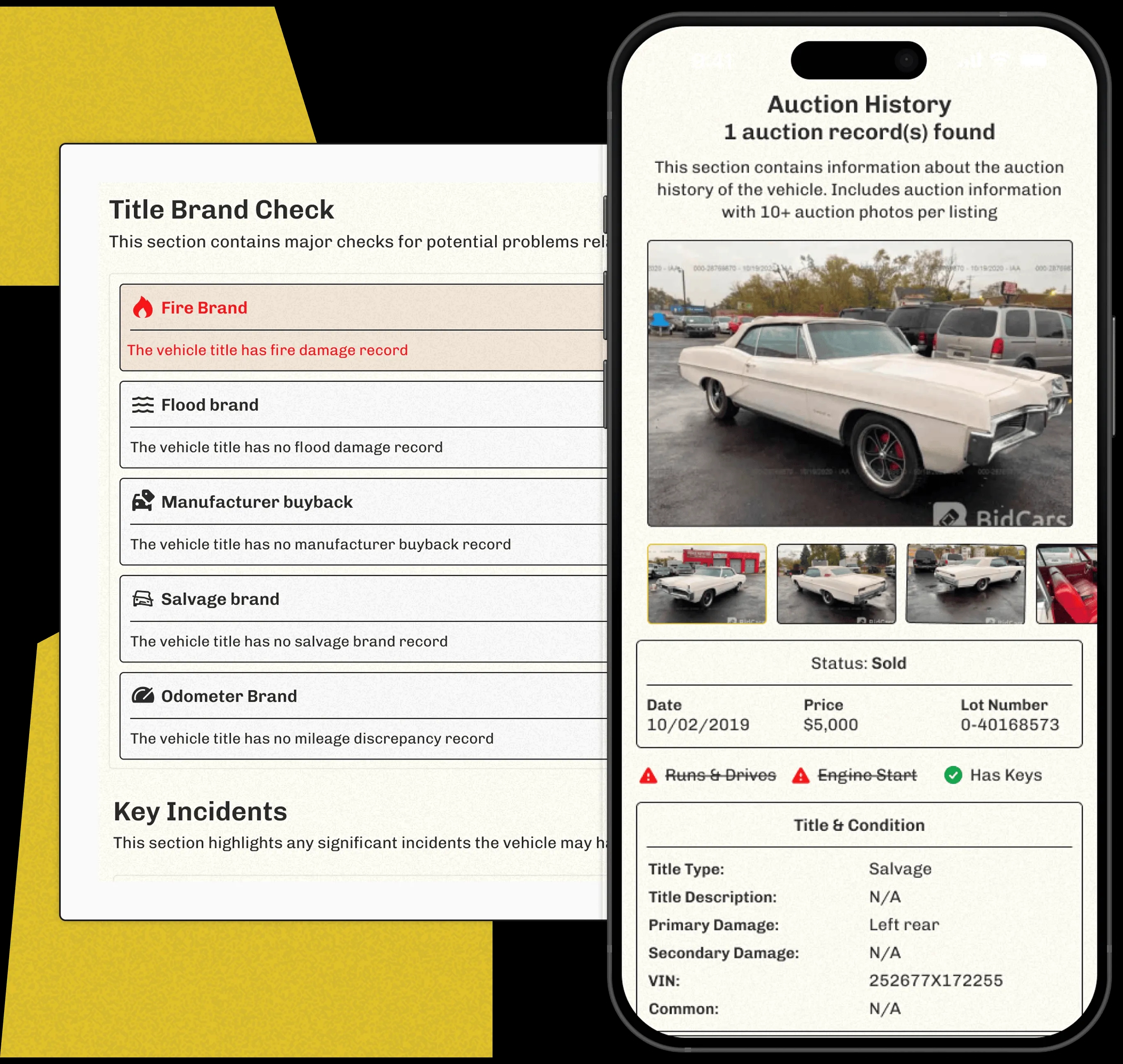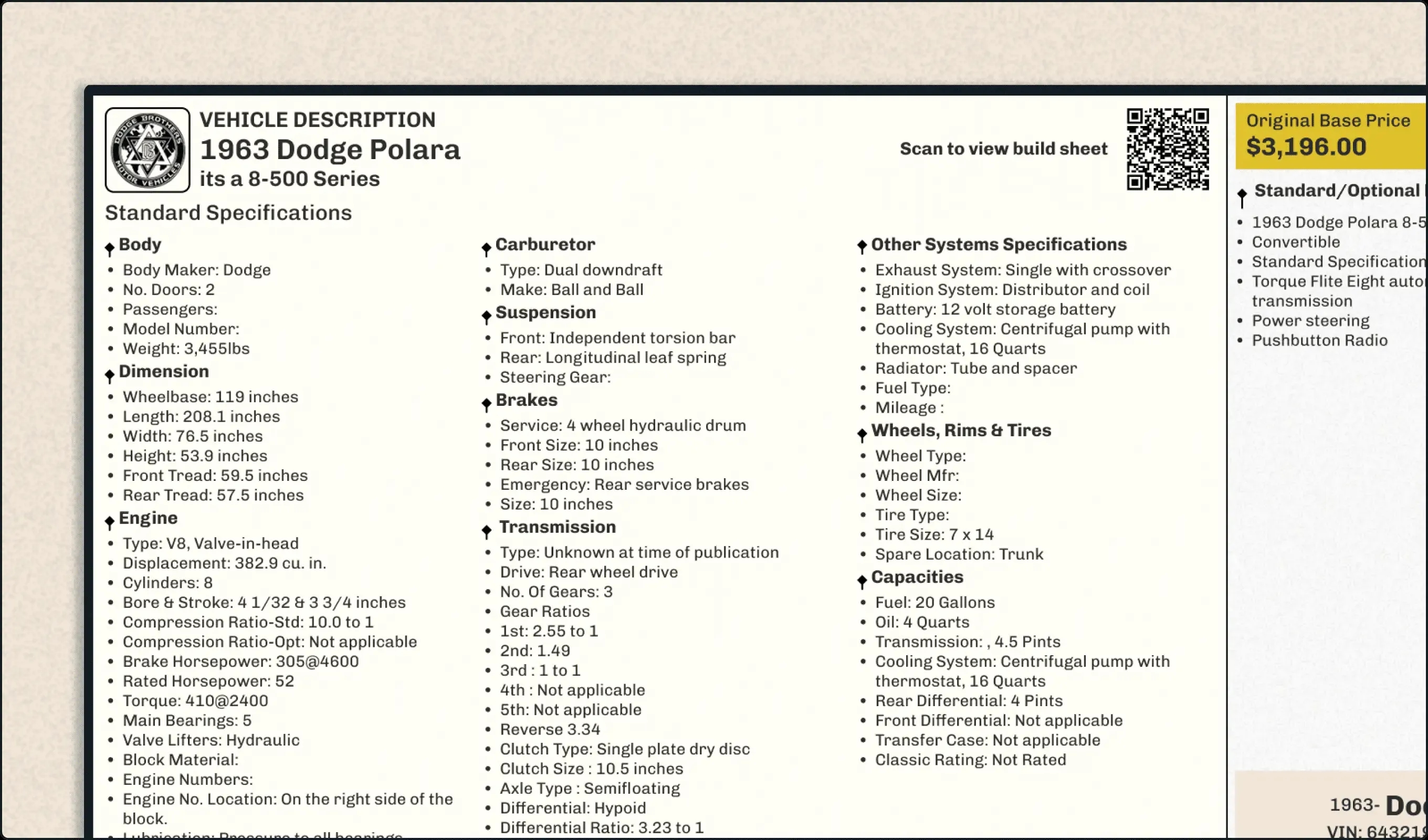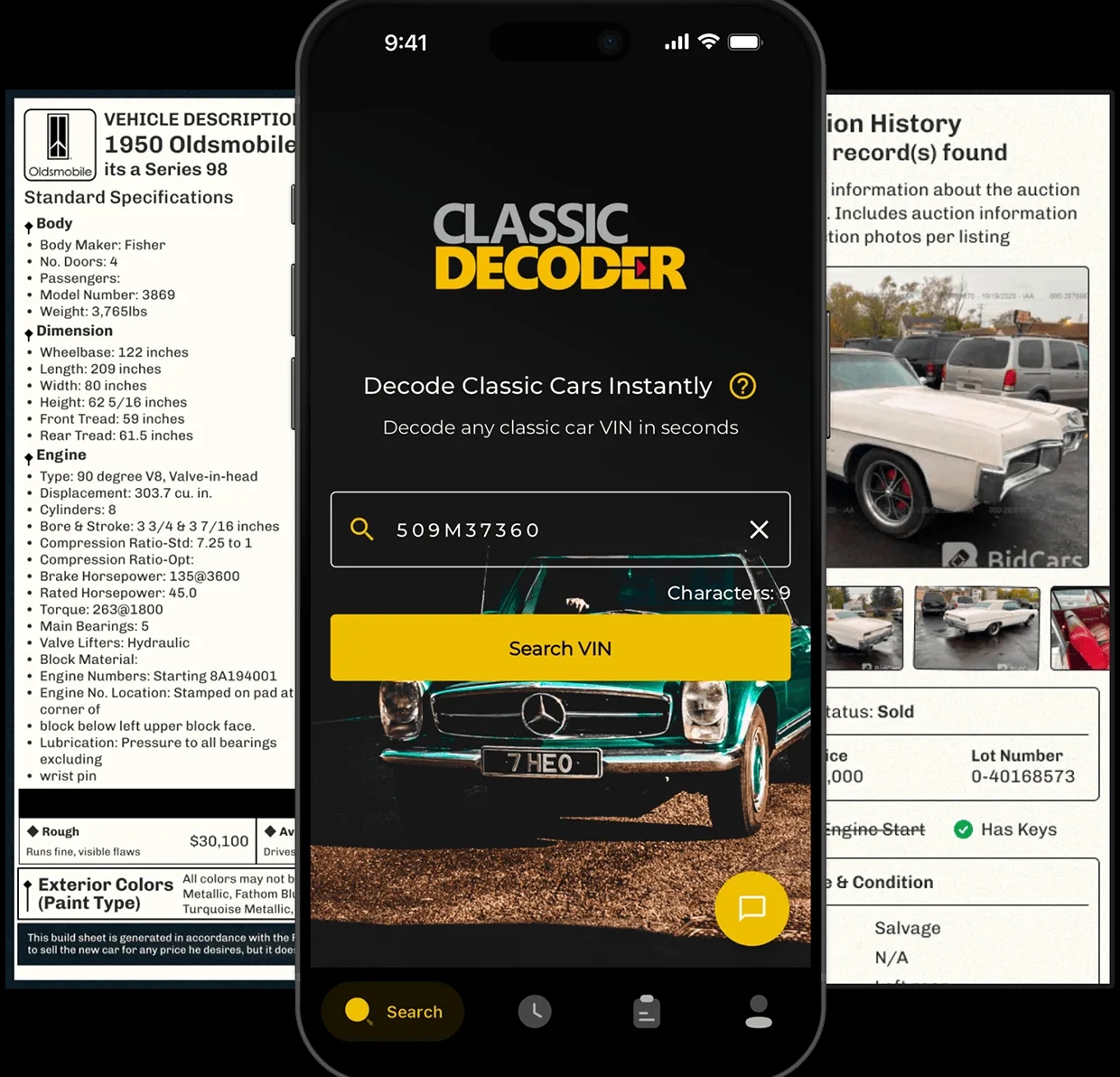1967 Pontiac Grand Prix
The '67 Grand Prix? A total knockout! This Pontiac marked a shift towards personal luxury, a stylish muscle car that wasn't just about power. Its sleek, almost-fastback lines, hidden headlights, and overall sophisticated vibe made it a huge hit, a symbol of '60s cool. A true classic.
Decode Classic VINs to Get Vehicle History Report and Build Sheet
Discover the 1967 Pontiac Grand Prix: An Icon of Classic Cars
Experience delving into the world of classic cars with the iconic 1967 Pontiac Grand Prix. As a hallmark of American luxury and performance, this remarkable model has etched its place in automotive history. Let's explore its fascinating journey through time, notable features, and famous owners who have contributed to its allure.

1967 Pontiac Grand Prix Models:
Select the vehicle's model to see the correct data for it.
How Much is Pontiac Grand Prix Worth?
Original MSRP :$3,549.00
Outstanding
Clean
Average
Rough
1967 Pontiac Grand Prix Specs
Interested in buying a classic car or selling one?
Access detailed history reports for classic vehicles from hundreds of manufacturers.
- Accident Records
- Theft Records
- Loan & Lien Information
- Auction Information
- Salvage Information and more

History of 1967 Pontiac Grand Prix
The 1967 Pontiac Grand Prix was born on an intermediate-based platform, incorporating powerful engine options and luxurious interiors. Its standard engine boasted 303 hp, and the top variant reached up to 370 hp—truly muscle car territory. From its elegant design to its upscale Morrokide vinyl bucket seats, this vehicle embodied the essence of stylish performance. The diverse features of the Grand Prix met the demand for luxury and speed during the rapidly changing automotive landscape of the 1960s. With roots dating back to 1967, the Grand Prix has held an esteemed position in pop culture and automotive circles. It's fascinating to reflect on how the market shifted back then, with U.S. manufacturers like Pontiac adapting to meet consumer demands for efficiency while maintaining the essence of power.
Learn more about a classic car: Get Build Sheet by VIN.
Access reproduced classic build sheets to learn more about your classic vehicle details.
- Standard Specifications
- Original Base Price
- Standard & Optional Equipment
- Exterior & Interior Colors
- VIN ID & Location description

Detailed Specifications of the Grand Prix
Built on a foundation of robust engineering, the Grand Prix stood out with its 389 cubic inch V8 engines and tri-power options that catered to thrill-seekers and cruisers alike. This car wasn't just about looks—it could sprint a quarter-mile in roughly 14.1 seconds when equipped with the high-output 390 hp option. Additionally, the refined Morrokide seats and tilt steering added to the plush driving experience. Each of these elements combined to make the Grand Prix a force both on the road and in drag racing circuits.
Famous Figures Who Own the Grand Prix
Jay Leno
Legendary comedian and talk show host Jay Leno is well-known for his extensive collection of classic cars, and the 1967 Pontiac Grand Prix holds a special place in his garage. His passion for automobiles is no secret, and he admires this model for its blend of luxury and American muscle.
Kym
In Australia, an owner named Kym reached out to shine a spotlight on the rarity of his '67 Grand Prix, sharing how only a handful remain registered today. Kym's dedication to preserving this classic model underscores the love and fascination owners have for their prized possessions, making them custodians of automotive history.
Other Celebrity Enthusiasts
Various other celebrities have been drawn to the Grand Prix, captivated by its robust history and charm. The glamor associated with celebrity ownership further cements the Grand Prix as a coveted item in the realm of classic vehicles. It's noteworthy how such stellar associations have reinforced its legendary status.

Legacy and Pop Culture Influence
The 1967 Grand Prix has made more waves in pop culture than a summer flick in latter years. Thanks to car shows, films like "Le Mans," and even catchy ads ("Aren't You Glad We Use Dials..."), this masterpiece is more than a car; it's a cultural symbol. Its recurring appearances in movies and TV shows echo its universal appeal and fashionable past.
Market Value and Collectibility
The Grand Prix, with its varied history and vibrant story, captures the interests of collectors worldwide. Market values have been, well, sort of erratic. A pristine 1967 Pontiac Grand Prix might demand pretty steep prices, but the actual figures rely deeply on its features and historical allure. It's a classic car conundrum—you could say appreciation really is in the eye of the beholder.
Interested in Buying or Selling a Classic Car?
Navigating the world of classic cars can be a journey, especially when it comes to authenticity and history. Here's where tools like a vehicle history report and the all-important step in to save the day.
Accident Records
Theft Records
Loan & Lien Information
Auction Information
Salvage Information and more
For those embarking on this journey, it's crucial to consider classic car to make informed decisions. As they say, "forewarned is forearmed."
Embark on your classic car journey with confidence, knowing the rich history and significance of the 1967 Pontiac Grand Prix. Whether you're an admirer or an owner, it's a model that continues to inspire and excite. Classic cars aren't just vehicles—they're stories waiting to be told.
Classic VIN Decoder App |Now available on both Android and iOS!
At Classic Decoder, we believe that developing a mobile app is a great way to extend our classic car data solution hub to as many users as possible across the globe. Our app is built with users and precision in mind. It holds the key to unlocking the history and details of any retro car at your fingertips. It also comes with fascinating and user-friendly features that make it stand out from other mobile apps designed for this purpose.
The Classic Decoder app lets you decode and lookup any classic VIN in a flash. Access accurate vehicle information and history, make an informed decision faster, and buy and trade in classic cars with confidence.

Download The Classic Decoder App now.
Some unique features include:
- Support all classic VIN lengths from 5 to 13 digits
- Support classic cars produced from 1910 – 1980
- Online Garage features – to add and manage your vehicles
- 24/7 Customer Support
- Easy onboarding for first-time users
Explore Pontiac Grand Prix from Other Years
Frequently Asked Questions
Well, let's see...the '67 Grand Prix is pretty unmistakable, really. Think sharp lines, a long hood, and that distinctive coke-bottle shape—you know, like a really stylish soda bottle! It's got a sporty stance, and those hidden headlights are a total giveaway. You'll also notice the prominent taillights, which are pretty iconic for the model. Oh, and the 'Endura' bumper—that's a soft rubber bumper that was pretty innovative for its time; it was designed to absorb impact better than your typical chrome bumper. Overall, it’s a head-turner, a real looker. Trust me, you won't miss one on the road.
The 1967 Grand Prix offered a few engine choices to suit different tastes (and budgets!). You could get it with a 321 cubic inch V8—a solid engine for everyday driving; it was a really popular option. If you wanted more oomph, the 400 cubic inch V8 was the way to go; it had enough power to make this car pretty sporty. And for those who really wanted to turn heads (and burn some rubber!), there was a 428 cubic inch V8; now that was a beast! It’s safe to say Pontiac catered to a wide range of performance needs, which I think is pretty cool.
The driving experience? Think comfortable cruiser with a bit of a kick. It's not a race car, though some folks really pushed the limits of the 428, but it's certainly no slouch. The handling is pretty good for its time, though, you know, it’s a big car, so it’s not going to corner like a go-kart. It rides pretty smoothly on the highway. It's a car you can actually enjoy driving, which is more than I can say for some classics. You'll feel that it's a muscle car, but it doesn't feel totally uncontrollable like some of its contemporaries. You know, a nice balance, really.
Ah, the million-dollar question! The value of a '67 Grand Prix varies wildly, depending on condition, mileage, and, you know, any custom modifications. A nicely restored one can fetch a pretty penny—we’re talking tens of thousands of dollars. But a project car? That could cost you way less. It’s kind of like buying a house; you get what you pay for. You’ll find that the condition heavily affects the price, and a well-maintained car will be worth considerably more than one that needs work. So, do your research before you buy!
Owning a classic car? It's a labor of love. Finding parts can sometimes be a challenge; some parts are easier to find than others, especially for the more obscure details. Rust is a common enemy of these older cars, especially in areas with harsh winters—think salty roads, they're brutal on old cars! And of course, regular maintenance is key; keeping things well-lubricated and regularly inspected is essential. But hey, that's all part of the adventure, isn’t it? Plus, there's a whole community of enthusiasts, and they're a great resource for advice and parts.

